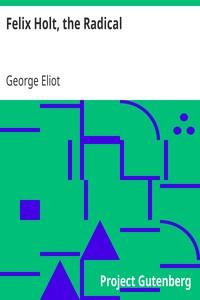Read this ebook for free! No credit card needed, absolutely nothing to pay.
Words: 178727 in 53 pages
This is an ebook sharing website. You can read the uploaded ebooks for free here. No credit cards needed, nothing to pay. If you want to own a digital copy of the ebook, or want to read offline with your favorite ebook-reader, then you can choose to buy and download the ebook.


: Felix Holt the Radical by Eliot George - England Fiction; Love stories; Domestic fiction; Fathers and daughters Fiction; Political fiction; Triangles (Interpersonal relations) Fiction; Radicals Fiction; Legal stories; Elections Fiction
d boy, the harvest of her life had been scanty. Could it be that now--when her hair was gray, when sight had become one of the day's fatigues, when her young accomplishments seemed almost ludicrous, like the tone of her first harpsichord and the words of the song long browned with age--she was going to reap an assured joy? to feel that the doubtful deeds of her life were justified by the result, since a kind Providence had sanctioned them?--to be no longer tacitly pitied by her neighbors for her lack of money, her imbecile husband, her graceless eldest-born, and the loneliness of her life; but to have at her side a rich, clever, possibly a tender, son? Yes; but there were the fifteen years of separation, and all that had happened in that long time to throw her into the background of her son's memory and affection. And yet--did not men sometimes become more filial in their feeling when experience had mellowed them, and they had themselves become fathers? Still, if Mrs. Transome had expected only her son, she would have trembled less; she expected a little grandson also: and there were reasons why she had not been enraptured when her son had written to her only when he was on the eve of returning that he already had an heir born to him.
But the facts must be accepted as they stood, and, after all, the chief thing was to have her son back again. Such pride, such affection, such hopes as she cherished in this fifty-sixth year of her life, must find their gratification in him--or nowhere. Once more she glanced at the portrait. The young brown eyes seemed to dwell on her pleasantly; but, turning from it with a sort of impatience, and saying aloud, "Of course he will be altered!" she rose almost with difficulty, and walked more slowly than before across the hall to the entrance-door.
Already the sound of wheels was loud upon the gravel. The momentary surprise of seeing that it was only a post-chaise, without a servant or much luggage, that was passing under the stone archway and then wheeling round against the flight of stone steps, was at once merged in the sense that there was a dark face under a red travelling-cap looking at her from the window. She saw nothing else; she was not even conscious that the small group of her own servants had mustered, or that old Hickes the butler had come forward to open the chaise door. She heard herself called "Mother!" and felt a light kiss on each cheek; but stronger than all that sensation was the consciousness which no previous thought could prepare her for, that this son who had come back to her was a stranger. Three minutes before, she had fancied that, in spite of all changes wrought by fifteen years of separation, she should clasp her son again as she had done at their parting; but in the moment when their eyes met, the sense of strangeness came upon her like a terror. It was not hard to understand that she was agitated, and the son led her across the hall to the sitting-room, closing the door behind them. Then he turned toward her and said, smiling--
"You would not have known me, eh, mother?"
It was perhaps the truth. If she had seen him in a crowd, she might have looked at him without recognition--not, however, without startled wonder; for though the likeness to herself was no longer striking, the years had overlaid it with another likeness which would have arrested her. Before she answered him, his eyes, with a keen restlessness, as unlike as possible to the lingering gaze of the portrait, had travelled quickly over the room, alighting on her as she said--
"Everything is changed, Harold. I am an old woman, you see."
"But straighter and more upright than some of the young ones!" said Harold; inwardly, however, feeling that age had made his mother's face very anxious and eager. "The old women at Smyrna are like sacks. You've not got clumsy and shapeless. How is it I have the trick of getting fat?" "I remember my father was as thin as a herring. How is my father? Where is he?"
"Gad! what a wreck poor father is! Paralysis, eh? Terribly shrunk and shaken--crawls about among his books and beetles as usual, though. Well, it's a slow and easy death. But he's not much over sixty-five, is he?"
"Sixty-seven, counting by birthdays; but your father was born old, I think," said Mrs. Transome, a little flushed with the determination not to show any unasked for feeling. Her son did not notice her. All the time he had been speaking his eyes had been running down the columns of the newspaper.
"But your little boy, Harold--where is he? How is it he has not come with you?"
"Oh, I left him behind, in town," said Harold, still looking at the paper. "My man Dominic will bring him, with the rest of the luggage. Ah, I see it is young Debarry, and not my old friend Sir Maximus, who is offering himself as candidate for North Loamshire."
"Yes. You did not answer me when I wrote to you to London about your standing. There is no other Tory candidate spoken of, and you would have all the Debarry interest."
Free books android app tbrJar TBR JAR Read Free books online gutenberg
More posts by @FreeBooks

: Workhouse Characters and other sketches of the life of the poor. by Nevinson Margaret Wynne - Poor England London; London (England) Social conditions; Workhouses England London








